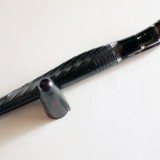Write E-books for Publicity and Even Profit: Part 1 — Why E-books?
An e-book is a book, article, or other self-contained written material that is circulated electronically, usually over the web. Although they’ve been slow to catch on — few people relish the thought of reading a novel-length book on their computer screen — e-books have started to gain a lot of popularity with the release of high-quality e-book reading devices like Amazon’s Kindle.
Lots of writers have written and distributed e-books, for various reasons:
- To make money: Since an e-book (unlike a website) is a discrete unit, it can be sold.
- To offer samples: Many writers give away a few chapters of their work to get people “hooked” and convince them to buy their book.
- To build awareness: Authors have given away e-books to win fans — hopefully they’ll buy your next book.
- To spread information: Sometimes you have a topic that you want to write about that isn’t worthwhile to publish — it’s either too short to make a full book worthwhile or the audience is too small. E-book costs are lower (often zero) so publishing via e-book often makes better sense.
- To show reader appreciation: Some writers publish e-books as freebies to thank their readers for their patronage.
- To promote other products: E-books can be filled with links to your website, to your other books on Amazon, or anywhere else on the Web.
- To get numbers: An unestablished writer looks good if s/he can go to a publisher showing that they’ve sold 10,000 copies of their e-book.
- To have control: An e-book allows a writer to control the presentation of their work in a way that posting it on the web doesn’t.
- To self-publish cheaply: With their low investment, e-books are an attractive alternative to traditional self-publishing.
- To supplement paper publication: Many authors offer the choice f an e-book alongside their traditional paper copies, for readers who use e-book devices, prefer to read on their computer, or just want the instant gratification of downloading a book instead of waiting for it to be mailed.
I’m sure there are other reasons I haven’t even thought of, too. The main point is that producing and distributing e-books is fairly cheap, and can make you some money either directly (through sales) or indirectly (through promoting your “brand”).
Just as there are a lot of reasons to write e-books, there are a lot of things to write e-books about. Of course, you could just transform any unsold book-length manuscript into an e-book (I say “unsold” because you probably don’t want to compete with the publisher of your paper books — and may no have the legal right to according to your publishing contract). But the e-book format is ideal for shorter works, too — a 30-page “how to” book, a sampler of short stories, a short personal narrative, or a collection of travel photos.
An e-book is an opportunity for you to establish your expertise in your field or niche without replacing your “bread and butter” writing. Think about the things that you do well and offer up a representative sample. Just like writing a traditional book, the choice of topics is limited only by your knowledge and taste and the demand you are trying to fill. If there’s a topic you’ve always thought about writing on but couldn’t imagine filling 250 pages with it, consider writing an e-book instead.
This series has been collected as a free e-book for you to download. Check it out on my e-books page.







Great post. I might do as you suggest.
In your second sentence, “few people relish the throught of reading a novel-length book on their computer screen,” the word “throught” should probably be “thought.”
I thought (no pun intended) you would want to know.
Thanks for the heads-up, Craig. “Throught” is one of my common errors, I guess because both “through” and “thought” are words one types a lot and my “finger memory” doesn’t catch the mistake. Anyway, fixed it now.
Of course, it could mean “to have thought through” something, couldn’t it? But then it would be wrong in that sentence anyway…
This is the introduction to a 5-part series (one-a-day this week), so hopefully there will be plenty of useful advice in days to come.
And, of course, plenty of interesting typos…
I’m glad to see this series about e-books. I’m a big fan of e-books and have written a series as well as several individual posts on my own blog. There are a lot of reasons I like e-books, but one of the most important is that my poor vision makes reading print difficult. With e-books, I can adjust the font to a comfortable size for me to read.
Don’t worry about teh typos, Dustin! 🙂
I think e-books are fascinating as a marketing strategy. I know that Leo killed on Zen Habits with his, especially when he then turned around and made the content free. Of course, he had another real book to back it up and so the publicity must have been good for sales.
I hope you’ll dive into the various strategies for moving e-books. There’s a lot to mine in this topic.
I discuss some marketing strategies later in the series, yes. I’m also working on a couple of commercial ebook ideas, one of which is almost ready to put out (which I’ll do over the summer) and I’ll write a post or maybe a series on marketing then based on what I try that works (and doesn’t work; I plan to experiment with a bunch of stuff I wouldn’t normally do).
The big lesson for writers, which has little to do with ebooks, is that we *all* need a crash course in Marketing, since publishers do less and less except for the most well-established writers. Ironically, you have to become a master of marketing these days if you want to become the kind of writer who doesn’t have to worry about marketing…
It seems to me that the most successful new writers have got it going on online, but that they have to make their own way. This might not be a bad thing though, because there are few publishers that seem to have any idea of to leverage the marketing power of the Internet.
Looking forward to the rest of the series, Dustin. I’m a programmer and Internet marketer by trade, so I’m always interested hearing others insight. There are just so many options online.
As a publicist who sees hundreds of books of all types each year, I don’t believe that ebooks are a hot product in and of themselves. There are only certain types of people who will buy them and use them. The marketplace is actually pretty small and most people still buy and read regular books.
So in my view, and what I advise my clients is this: Once you own a body of intellectual property, sell it every way you can. An ebook is just one form of publishing. You can print it POD, publish it in with Kindle, package it in a pdf file, break it into pieces and let people subscribe to it, you can teach with it, use it as a freebie for people who pay for a workshop, you can use it as a calling card for higher cost services, and lots more.
The key is to think of what you are doing like you are making candy, intellectual candy.
People always remember where they get good candy. It produces a physical sensation that creates the sensation of physical pleasure and specific chemicals are released in the body — chemical memory is the result. This is the branding that takes place when we see or even better expereince, something remarkable.
So no matter how you publish, focus first on creating something truly incredible. Then when people hear about it, they’ll want it, and they’ll be interested in anything else you sell.
So write to sell. Don’t stop the development process till you can relaibvly demonstrate that what you have created actually sells.
Then publish. Publish your ebook, publish your hard c opies, publish your videos, and your dvd’s and mp3’s.
Youi can see more of my ideas on this how this translates into marketing and publicity at the free articles at my website http://www.DirectContactPR.com
In particular look for the article titled The Magic of Business”.
From a publicity point of view, the media actually don’t care what the product is. They are only interested in publishing three things: news, education and entertainment. They honestly couldn’t care less about whether you wrote a book. To them in many situations, is just a credential to you being a person who’s qualified to give a newsworthy comment.
So we can get people publicity whether they’ve written and published a book or not. All we focus on is what they media needs.
So no matter what type of book or service you have, getting publicity is a completely separate task and requires you to use different ideas.
The key to your success is being truly great at what you do. Help the people you can help the most. That;s what will get you attention. That’s how you create and deliver value. That’s how you market and achieve success and happiness.
Regards,
Paul J. Krupin
Direct Contact PR
http://www.DirectContactPR.com
Paul: Thank you! That looks like great advice, all of it. In a nutshell, it boils down to treating writing like a business — which many writers absolutely hate the idea of. We don’t want to be “reduced” to pumping out “product” — we’re artists, dangit! But I think there’s another way to think about the business aspect: we talk a lot about the ‘craft” of writing, but we rarely think of ourselves as “craftsmen” or “craftswomen” (that’s an awkward construction, I know!). Your silversmith, printer, brewer, etc. had to think about both creating and marketing that creation, about dreaming up and realizing great artistic ideas and getting people aware of and interested in the results of those great ideas. I don’t think there’s any real disconnect there — but I know it’s hard to grasp for many.
I love this series on how to create ebooks. Here’s something I’ve done with free ebooks that has been really profitable.
I publish a weekly electronic newsletter on how to generate free publicity. In early December each year, I pluck out the top 24 best items from my newsletters, hire somebody over at Elance.com to compile them into an ebook and do all the formating.
Then I load it up with links to product pages at my website and affiliate links. I give the book away as a Christmas gift to my readers and encourage them to regift the book to their readers.
You’d think I’d just given them each a new car, and the praise and hosannas come pouring in. But here’s the best part. My shopping cart can track how much money I’ve made from each ebook. Each book has resulted in several thousand dollars in sales, and that’s just my own products. It doesn’t count all the affiliate commission I made.
If you want to see samples of the books, download them and regift them, you can see them at the top of the page at http://www.publicityhound.com/publicity-products/free.html
P.S. Dustin, I just discovered your blog and love it.
Joan: Thanks for the compliments and the advice — that seems like a really good idea. A similar idea is to round-up blog posts into an ebook. If the material is valuable enough, you can even sell it, as Leo Babauta did recently with his Handbook for Life, a collection of his best blog posts.